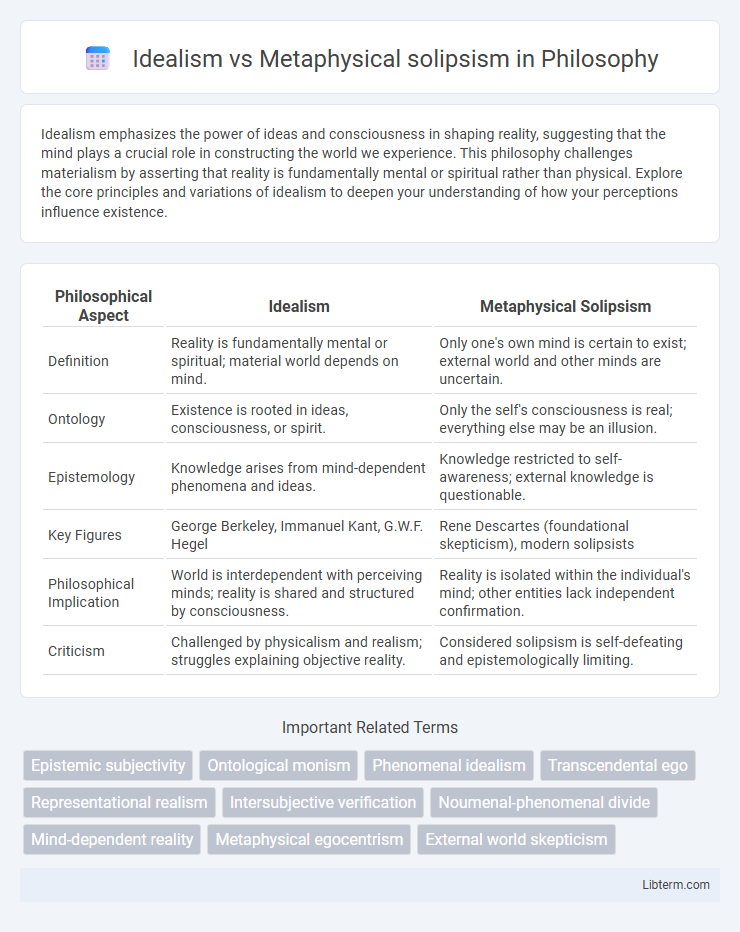Idealism emphasizes the power of ideas and consciousness in shaping reality, suggesting that the mind plays a crucial role in constructing the world we experience. This philosophy challenges materialism by asserting that reality is fundamentally mental or spiritual rather than physical. Explore the core principles and variations of idealism to deepen your understanding of how your perceptions influence existence.
Table of Comparison
| Philosophical Aspect | Idealism | Metaphysical Solipsism |
|---|---|---|
| Definition | Reality is fundamentally mental or spiritual; material world depends on mind. | Only one's own mind is certain to exist; external world and other minds are uncertain. |
| Ontology | Existence is rooted in ideas, consciousness, or spirit. | Only the self's consciousness is real; everything else may be an illusion. |
| Epistemology | Knowledge arises from mind-dependent phenomena and ideas. | Knowledge restricted to self-awareness; external knowledge is questionable. |
| Key Figures | George Berkeley, Immanuel Kant, G.W.F. Hegel | Rene Descartes (foundational skepticism), modern solipsists |
| Philosophical Implication | World is interdependent with perceiving minds; reality is shared and structured by consciousness. | Reality is isolated within the individual's mind; other entities lack independent confirmation. |
| Criticism | Challenged by physicalism and realism; struggles explaining objective reality. | Considered solipsism is self-defeating and epistemologically limiting. |
Introduction to Idealism and Metaphysical Solipsism
Idealism asserts that reality is fundamentally mental or immaterial, positing that the external world exists only as ideas within consciousness. Metaphysical solipsism takes a more extreme stance, claiming that only one's own mind is certain to exist, and everything external is a projection of that singular consciousness. These philosophies explore the nature of existence and knowledge, challenging the independence of the external world from the perceiver's mind.
Defining Idealism: Core Principles
Idealism asserts that reality is fundamentally mental, with consciousness or ideas constituting the primary substance of existence. Core principles include the belief that physical objects depend on the mind for their existence and that perception is central to understanding reality. This contrasts with metaphysical solipsism, which posits that only one's own mind is certain to exist, denying the independent existence of external reality.
Understanding Metaphysical Solipsism
Metaphysical solipsism asserts that only one's mind and its experiences are certain to exist, denying the independent reality of external objects and other minds. This philosophical stance places consciousness as the sole foundation of reality, challenging the idealist view that an external mind or a shared metaphysical substance constructs the world. Understanding metaphysical solipsism involves recognizing its radical skepticism towards external existence and the primacy of subjective experience in defining what is real.
Historical Origins and Key Philosophers
Idealism, rooted in Plato's theory of forms and advanced by philosophers like George Berkeley, holds that reality is fundamentally mental or immaterial, emphasizing the mind's role in constituting existence. Metaphysical solipsism, associated with figures such as Rene Descartes and later interpretations in 20th-century philosophy, asserts that only one's own mind is sure to exist, casting doubt on the external world's reality. Key historical origins trace idealism to ancient Greek philosophy and early modern thought, while metaphysical solipsism emerged from radical skepticism and introspective inquiry into consciousness.
Reality and Perception: Idealism’s Perspective
Idealism posits that reality is fundamentally mental or spiritual, asserting that the external world exists only as ideas perceived by the mind. Reality, from this perspective, is inseparable from perception, meaning that objects do not possess independent existence outside consciousness. This contrasts with metaphysical solipsism, which reduces reality solely to the individual's mind, whereas idealism acknowledges a shared, intersubjective realm of ideas shaping experience.
The Solipsist’s Conception of Existence
The solipsist's conception of existence centers on the idea that only the self and its mind are certain to exist, casting doubt on the reality of an external world or other minds. Unlike idealism, which posits that reality is fundamentally mental but potentially shared, metaphysical solipsism denies any independent existence beyond the individual consciousness. This perspective challenges common ontologies by asserting that all perceived objects and beings are mere representations within the solipsist's mind.
Comparative Analysis: Points of Convergence
Idealism and metaphysical solipsism both assert that reality is fundamentally mental or dependent on consciousness, emphasizing the primacy of the mind in the existence of the external world. Both perspectives challenge materialism by positing that physical objects do not exist independently of perception or thought. They converge on the idea that knowledge of the external world is mediated by subjective experience, making consciousness the cornerstone of ontological reality.
Divergent Views on External Reality
Idealism asserts that external reality is fundamentally mental or spiritually constructed, emphasizing the dependence of the material world on the perceiving mind. Metaphysical solipsism posits that only the self's mind is certain to exist, denying the independent existence of any external reality. These divergent views highlight a critical philosophical divide: idealism allows for a shared or collective mental realm, whereas solipsism confines reality exclusively within the solitary consciousness.
Philosophical Implications and Criticisms
Idealism posits that reality is fundamentally mental and dependent on perceiving minds, emphasizing collective consciousness, whereas Metaphysical Solipsism asserts that only one's own mind is certain to exist, leading to radical skepticism about external reality. Philosophical implications of Idealism include challenges to materialism and support for the unity of perception, while Metaphysical Solipsism raises issues regarding the existence of other minds and the nature of objective truth. Criticisms of Idealism often target its difficulty explaining empirical evidence, whereas Metaphysical Solipsism is criticized for being logically self-defeating and epistemologically isolating.
Conclusion: Reconciling Idealism and Solipsism
Reconciling idealism and metaphysical solipsism involves acknowledging the shared emphasis on consciousness as the foundation of reality while addressing their differing scopes of existence. Idealism posits that all entities depend on a universal mind, expanding beyond the solitary self of solipsism, which asserts only one's consciousness directly exists. This synthesis highlights a spectrum where individual consciousness is part of an interconnected metaphysical framework, enabling a cohesive understanding of subjective experience and objective existence.
Idealism Infographic

 libterm.com
libterm.com